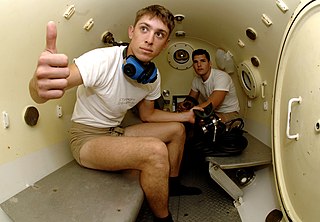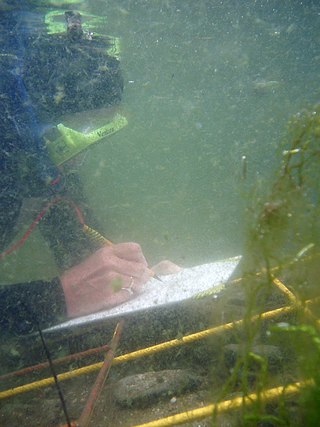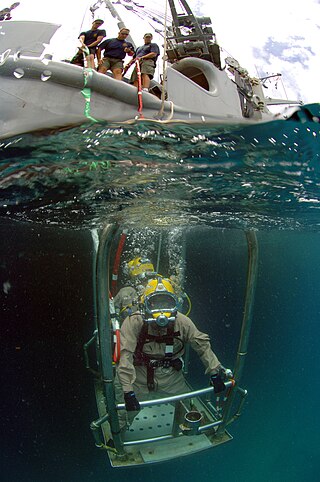Related Research Articles

Recreational diver training is the process of developing knowledge and understanding of the basic principles, and the skills and procedures for the use of scuba equipment so that the diver is able to dive for recreational purposes with acceptable risk using the type of equipment and in similar conditions to those experienced during training.

Diving activities are the things people do while diving underwater. People may dive for various reasons, both personal and professional. While a newly qualified recreational diver may dive purely for the experience of diving, most divers have some additional reason for being underwater. Recreational diving is purely for enjoyment and has several specialisations and technical disciplines to provide more scope for varied activities for which specialist training can be offered, such as cave diving, wreck diving, ice diving and deep diving. Several underwater sports are available for exercise and competition.

Recreational diving or sport diving is diving for the purpose of leisure and enjoyment, usually when using scuba equipment. The term "recreational diving" may also be used in contradistinction to "technical diving", a more demanding aspect of recreational diving which requires more training and experience to develop the competence to reliably manage more complex equipment in the more hazardous conditions associated with the disciplines. Breath-hold diving for recreation also fits into the broader scope of the term, but this article covers the commonly used meaning of scuba diving for recreational purposes, where the diver is not constrained from making a direct near-vertical ascent to the surface at any point during the dive, and risk is considered low.

Professional diving is underwater diving where the divers are paid for their work. Occupational diving has a similar meaning and applications. The procedures are often regulated by legislation and codes of practice as it is an inherently hazardous occupation and the diver works as a member of a team. Due to the dangerous nature of some professional diving operations, specialized equipment such as an on-site hyperbaric chamber and diver-to-surface communication system is often required by law, and the mode of diving for some applications may be regulated.

Commercial diving may be considered an application of professional diving where the diver engages in underwater work for industrial, construction, engineering, maintenance or other commercial purposes which are similar to work done out of the water, and where the diving is usually secondary to the work.

Police diving is a branch of professional diving carried out by police services. Police divers are usually professional police officers, and may either be employed full-time as divers or as general water police officers, or be volunteers who usually serve in other units but are called in if their diving services are required.

Diving medicine, also called undersea and hyperbaric medicine (UHB), is the diagnosis, treatment and prevention of conditions caused by humans entering the undersea environment. It includes the effects on the body of pressure on gases, the diagnosis and treatment of conditions caused by marine hazards and how relationships of a diver's fitness to dive affect a diver's safety. Diving medical practitioners are also expected to be competent in the examination of divers and potential divers to determine fitness to dive.

Scuba diving is a mode of underwater diving whereby divers use breathing equipment that is completely independent of a surface breathing gas supply, and therefore has a limited but variable endurance. The name scuba is an anacronym for "Self-Contained Underwater Breathing Apparatus" and was coined by Christian J. Lambertsen in a patent submitted in 1952. Scuba divers carry their own source of breathing gas, usually compressed air, affording them greater independence and movement than surface-supplied divers, and more time underwater than free divers. Although the use of compressed air is common, a gas blend with a higher oxygen content, known as enriched air or nitrox, has become popular due to the reduced nitrogen intake during long or repetitive dives. Also, breathing gas diluted with helium may be used to reduce the effects of nitrogen narcosis during deeper dives.

Scientific diving is the use of underwater diving techniques by scientists to perform work underwater in the direct pursuit of scientific knowledge. The legal definition of scientific diving varies by jurisdiction. Scientific divers are normally qualified scientists first and divers second, who use diving equipment and techniques as their way to get to the location of their fieldwork. The direct observation and manipulation of marine habitats afforded to scuba-equipped scientists have transformed the marine sciences generally, and marine biology and marine chemistry in particular. Underwater archeology and geology are other examples of sciences pursued underwater. Some scientific diving is carried out by universities in support of undergraduate or postgraduate research programs, and government bodies such as the United States Environmental Protection Agency and the UK Environment Agency carry out scientific diving to recover samples of water, marine organisms and sea, lake or riverbed material to examine for signs of pollution.

A Diving certification or C-card is a document recognizing that an individual or organization authorized to do so, "certifies" that the bearer has completed a course of training as required by the agency issuing the card. This is assumed to represent a defined level of skill and knowledge in underwater diving. Divers carry a qualification record or certification card which may be required to prove their qualifications when booking a dive trip, hiring scuba equipment, having diving cylinders filled, or in the case of professional divers, seeking employment.

The diving supervisor is the professional diving team member who is directly responsible for the diving operation's safety and the management of any incidents or accidents that may occur during the operation; the supervisor is required to be available at the control point of the diving operation for the diving operation's duration, and to manage the planned dive and any contingencies that may occur. Details of competence, requirements, qualifications, registration and formal appointment differ depending on jurisdiction and relevant codes of practice. Diving supervisors are used in commercial diving, military diving, public safety diving and scientific diving operations.
The Australian Diver Accreditation Scheme (ADAS) is an international commercial and occupational diver certification scheme. It has mutual recognition arrangements with other equivalent national schemes. ADAS qualifications have international recognition.

Diver training is the set of processes through which a person learns the necessary and desirable skills to safely dive underwater within the scope of the diver training standard relevant to the specific training programme. Most diver training follows procedures and schedules laid down in the associated training standard, in a formal training programme, and includes relevant foundational knowledge of the underlying theory, including some basic physics, physiology and environmental information, practical skills training in the selection and safe use of the associated equipment in the specified underwater environment, and assessment of the required skills and knowledge deemed necessary by the certification agency to allow the newly certified diver to dive within the specified range of conditions at an acceptable level of risk. Recognition of prior learning is allowed in some training standards.

A diving instructor is a person who trains, and usually also assesses competence, of underwater divers. This includes freedivers, recreational divers including the subcategory technical divers, and professional divers which includes military, commercial, public safety and scientific divers.

The following outline is provided as an overview of and topical guide to underwater diving:

A diving team is a group of people who work together to conduct a diving operation. A characteristic of professional diving is the specification for minimum personnel for the diving support team. This typically specifies the minimum number of support team members and their appointed responsibilities in the team based on the circumstances and mode of diving, and the minimum qualifications for specified members of the diving support team. The minimum team requirements may be specified by regulation or code of practice. Some specific appointments within a professional dive team have defined competences and registration may be required.
Commercial divers as defined in the Diving Regulations to the Occupational Health and Safety Act 85 of 1993 are required to be registered with the Department of Employment and Labour. The Department of Employment and Labour has jurisdiction only within the national borders of South Africa, and therefore registered diving schools are required to operate within the borders of South Africa where the Diving Regulations apply. A registered diving school is required to comply with the Code of Practice for Commercial Diver Training, and the training standards published by the department for divers, supervisors and instructors respectively.
A diver training standard is a document issued by a certification, registration regulation or quality assurance agency, that describes the prerequisites for participation, the aim of the training programme, the specific minimum competences that a candidate must display to be assessed as competent, and the minimum required experience that must be recorded before the candidate can be registered or certified at a specific grade by the agency. A standard is a description of the quality required of a product, or a way of doing something that has usually been derived from the experience of experts in a specific field. The purpose is to provide a reliable method for people to share a reasonably consistent expectation regarding the scope and quality of the product or service. Training standards allow objective comparison between the training provided by various agencies and the competence indicated by certification or registration to the specific standard, though in most cases, training and competence may exceed the minimum requirement much of the time, and variation between newly certified divers can be considerable, partly due to differences in the training, and partly due to qualities of the candidate. Training standards may narrowly prescribe the training, or may concentrate on assessment of exit level competence, and allow recognition of prior learning based on various forms of evidence. To be useful, a training standard must be sufficiently specific to allow agreement on the requirements by most readers reasonably competent in the field, including the instructors, assessors, and learners who must use it, the employers of persons trained, the potential customers, and any quality assurance personnel who may need to enforce it. A training standard may be linked to a code of practice referring to how the training should be carried out.
Recreational scuba certification levels are the levels of skill represented by recreational scuba certification. Each certification level is associated with a specific training standard published by the certification agency, and a training programme associated with the standard., though in some cases recognition of prior learning can apply. These levels of skill can be categorised in several ways: